Iran Claims 'Terror' Group Backed By US And Israel Demolished

Iranian intelligence claimed September 28 that a "terror" group was uncovered and showed "confessions" of a few people, linking the plot to the US and Israel.

Iranian intelligence claimed September 28 that a "terror" group was uncovered and showed "confessions" of a few people, linking the plot to the US and Israel.
Iran’s intelligence ministry and the state television have reported about the demolition of “terrorist” group and the killing of its leader, saying they were engaged in plots directed by “enemies”.
The ministry said the group “directed and supported by enemy intelligence services” intended “to engage in sabotage operations” in Iran.
The intelligence ministry did not mention any country, but the state television, controlled by Supreme Leader Ali Khamenei, broadcast a documentary after the news was announced, referring to the meeting last week of US President Joe Biden and Israeli Prime Minister Naftali Bennett. It said that the US and Israel were behind the group.
The documentary also alleged that Bennett told Biden about the strategy of “death by a thousand knife wounds” in regards with Iran.
Iran has been the target of several high-profile sabotage operations since July 2020 attributed to Israel.
The documentary also showed self-incriminatory “confessions” of a few men and women who said they intended “to engage in acts of sabotage”.
Iranian intelligence services and the state television periodically claim “terror” plots were uncovered and underground groups arrested, but rarely they produce any evidence or follow up with news about investigations or trials.
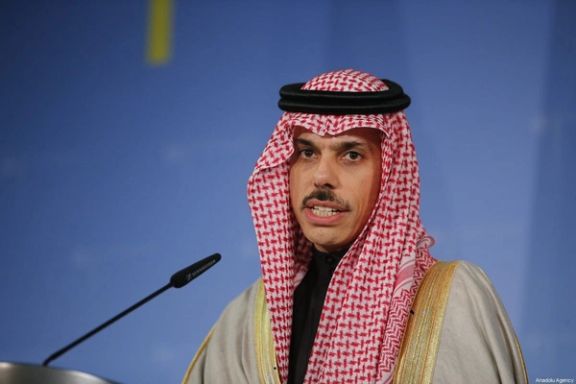
As top US officials variously meet leading Saudis, Iran’s deputy foreign minister calls for Riyadh to open its atomic sites to full inspection and for Israel to sign NPT.
Iran's Deputy Foreign Minister Reza Najafi Tuesday urged Saudi Arabia to be transparent over its nuclear activities and open up the access of the United Nations’ International Atomic Energy Agency (IAEA).
Najafi rejected remarks by Saudi Foreign Minister Prince Faisal bin Farhan earlier Tuesday to the UN General Assembly criticising “Iran's continued breaches and violations of international agreements and treaties related to the nuclear agreement, and its escalation of its nuclear activities in addition to research and development activities.”
Addressing the UN General Assembly’s high-level meeting held to commemorate and promote International Day for the Total Elimination of Nuclear Weapons (September 26), Najafi said Iran rejected the retention, stockpiling, development, use, and proliferation of nuclear arms.
Iran is in a dispute with the International Atomic Energy Agency (IAEA) over traces of previously undeclared radioactive material that it has failed to fully explain and over monitoring access to the UN nuclear watchdog.
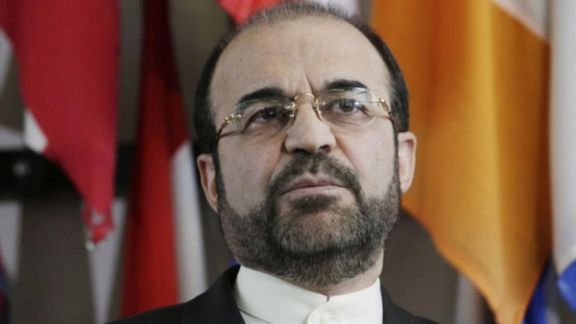
It has also been enriching uranium to 60 percent and stockpiling it in violation of the 2015 nuclear agreement with world powers.
Najafi condemned the modernization and strengthening of nuclear arsenals by the United States and other nuclear-weapon states in violation of their arms-reduction commitments under the Nuclear Non-Proliferation Treaty (NPT). Najafi said Israel continued to "threaten peace and security in the Middle East and beyond through its clandestine nuclear program," and urged the world to invite Israel to join the NPT and place its nuclear facilities under IAEA monitoring.
Unlike Israel, which is believed to hold around 180 nuclear bombs, both Iran and Saudi Arabia are NPT signatories. Saudi Arabia – which has no nuclear reactor but reportedly past nuclear links with both Iraq and Pakistani scientist AQ Khan – has limited the Safeguards access of the IAEA under a ‘small quantities protocol.’
Referring to a 2018 interview with the US CBC's 60 Minutes program in which Saudi Crown Prince Mohammed bin Salman suggested Riyadh might adopt nuclear weapons if Iran developed one, Iran's state-run English channel Press TVand Tasnim news agency both claimed Wednesday that there is “international concern” over Saudi Arabia’s nuclear ambitions.
Saudi Arabia backed former United States president Donald Trump’s 2018 withdrawal from Iran’s 2015 deal with world powers limiting its nuclear program – the JCPOA, Joint Comprehensive Plan of Action. The new administration of President Joe Biden has continued Trump’s ‘maximum pressure’ sanctions as Iran has continued to expand its atomic program with steps that began in 2019.
Prince Faisal this week met with US special envoy for Iran Robert Malley on the sidelines of the UN General Assembly to discuss recent developments in Iran's nuclear case. US National Security Advisor Jake Sullivan met with Saudi Arabia’s Crown Prince Mohammed bin Salman in Saudi Arabia Tuesday to discuss Yemen and Iran - the White House kept Sullivan’s visit low-profile and no photos were issued.
In his speech to the annual UN General Assembly last week, Saudi Arabia's King Salman bin Abdulaziz expressed hope that continuing talks with Iran, brokered by Baghdad, to restore relations would build confidence. The kingdom cut diplomatic ties in 2016 when protestors attacked its Tehran embassy after Riyadh executed 47 dissidents including leading Shi'ite cleric Sheikh Nimr al-Nimr.
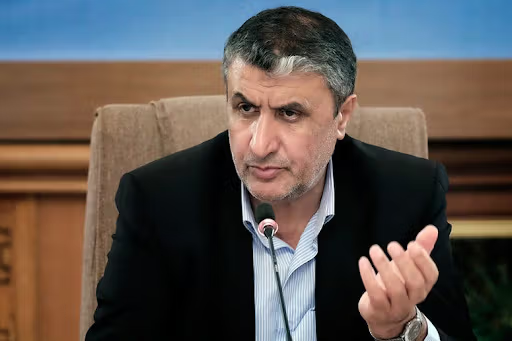
Iran nuclear chief says he has agreed with Russia to pay a 500-million euro debt in installments to keep civilian nuclear reactor projects going.
Mohammad Eslami, vice president and head of Iran’s atomic energy agency visiting Russia has said on Wednesday that he has reached an agreement about gradual payment of Tehran’s debts to Moscow.
Iran had previously said that it owes 500 million euros for services Russia rendered to maintain the Bushehr nuclear power reactor. Russia built the reactor and continues to assist Iran in maintaining its operation.
The official government news website IRNA quoted Eslami as saying that he met with Alexey Likhachev, Director General of Russia’s Rosatomand negotiated an agreement for installment payments to clear its debt, which has gone unpaid for 22 months. Eslami expressed hope that with this agreement current projects can proceed without major disruptions.
Iran is expanding the Bushehr reactor by planning to add phase two and three reactors to generate more electricity. The country suffers from a chronic shortage of electrical power, with daily outages that cripple industry and anger home consumers.
The Bushehr reactor is not part of the current nuclear dispute between the West and Iran, as Russia handles the nuclear fuel cycle. Iran has been enriching uranium at other facilities and stockpiling more purified fissile material that has alarmed the United States and its European allies.
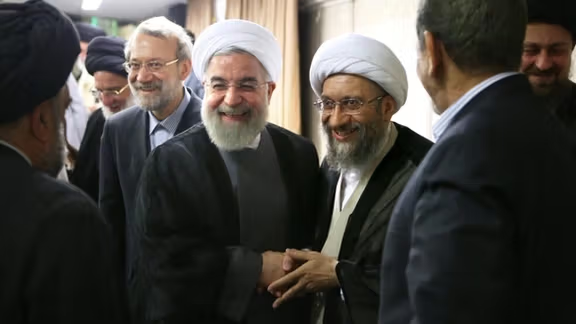
Many in Iran ask if former president Hassan Rouhani and parliament speaker Ali Larijani have been pushed out of the ruling circle for good by hardliners.
Iranian reformist politicians have been wondering about the political future of former President Hassan Rouhani and former Majles (parliament) Speaker Ali Larijani as they have been absent from the political scene after the Raisi administration took over in August.
Rouhani has been last seen at Raisi's inauguration at the Iranian parliament in early August and Larijani was seen last week after a long absence at a commemoration ceremony for a top Shiite cleric in his hometown, Amol.
It is not just a matter of their political futures. Some have also been asking about Rouhani's whereabouts. Anecdotal accounts say he was summoned to court in mid-September for an investigation, while other rumors indicate that he has been visiting Austria to see her daughter. None of the reports have been verified by independent sources.
Hardliners in parliament have been calling for Rouhani's prosecution on various grounds, mostly evolving around his alleged failures as president.
In a September 28 interview with the Iranian Labor News Agency (ILNA), Gholamreza Nouri, a self-proclaimed "politically independent" member of the Iranian parliament said that "both Rouhani and Larijani will certainly react to developments in the Iranian society."
Nouri's comment contradicts the two former politicians recent behavior as no one has heard anything from them for several weeks now. However, Nouri made it clear that he has not seen the duo for a long time now.
He also accused politicians he did not name of pushing individuals loyal to the regime out of the power circle and “kicking them out of the train of the Islamic revolution.” Meanwhile, he said that the "scenario of purging the regime" in order to come up with a unified system will backfire at one point and those who created that scenario will have be accountable for its repercussions.
Asked whether Rouhani or Larijani are planning to set up a political party, he said he did now, but added: "Knowing the two men, I am sure they would rush to solve the people's problems if anyone asks them."He said that "it is so sad to see individuals like Rouhani or Larijani in isolation."
Earlier, reformist activist and former MP Daryoush Ghanbari described Rouhani's situationas part of the political transformation as a result of the presidential election. "Obviously, Rouhani has lost his position because another president has been elected. But I have no idea if the political system is going to assign him to another position."
Ghanbari said that "Rouhani was in a difficult position during his presidency as he failed to satisfy the people, and / or the political system. Rouhani was an unlucky man. His policy of negotiation failed when Trump came to power in America." Summing up the situation, Ghanbari said, "It is unlikely that the regime would set aside Rouhani as he has been part of the regime since 1979 and has run the affairs of the state in the most difficult situations."
Speaking about the situation of Ali Larijani, Ghanbari said, "Larijani has not been set aside…Larijani is still Khamenei's adviser."
Earlier in September, conservative news website Alef quoted conservative commentator Nasser Imani as having said that "It is not good to see that the country is being gradually deprived of the services of its key politicians." The website opined that the Larijani brothers might return to political activity in other capacities and be assigned to top positions once again in the future."
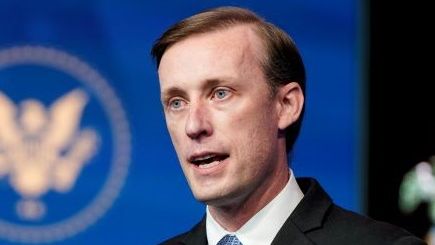
US National Security Advisor Jake Sullivan had a low-profile meeting with top Saudi officials to discuss Yemen and reducing tensions with Iran.
US National Security Advisor Jake Sullivan met Saudi Arabia’s Crown Prince Mohammed bin Salman and other officials on Tuesday to discuss the war in Yemen and reducing tensions in the Middle East.
The White House has kept the visit, which was Sullivan’s first Middle East trip as a low-profile diplomatic event and no photos were published. This was also the highest-level trip by a US official to Saudi Arabia since President Joe Biden took office.
Deputy Minister of Defense Khalid bin Salman, Interior Minister Abdulaziz bin Saud bin Nayef, National Guard Minister Abdullah bin Bandar, and Minister of State and national security adviser Musaed al-Aiban also attended the meeting.
Sullivan who was accompanied by special envoy for Yemen Tim Lenderking discussed ways to end the war in Yemen. The two sides also discussed measures to reduce tensions in the region, including with Iran, and Sullivan expressed satisfaction at measures such as a recent summit in Baghdad that brought regional countries together.
Saudi Arabia backed former president Donald Trump’s tough stance against Iran and its relations with the Biden Administration have not been so strong. Riyadh and its allies in the region are apprehensive at Biden’s attempts to restore the 2015 nuclear deal with Tehran and lift sanctions.
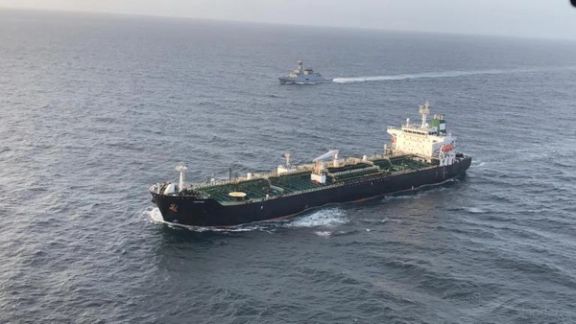
The US has made diplomatic appeals to China to reduce its oil imports from Iran in order to put pressure on Tehran to come to an agreement on its nuclear program.
By Arshad Mohammed and John Irish
WASHINGTON/PARIS, Sept 28 (Reuters) - The United States has reached out to China diplomatically about reducing its purchases of Iranian crude oil, U.S. and European officials said on Tuesday, as Washington seeks to persuade Tehran to resume talks about reviving the 2015 nuclear deal.
Purchases of Iranian oil by Chinese companies are believed to have helped keep Iran's economy afloat despite U.S. sanctions that are designed to choke off such sales to put pressure on Iran to curb its nuclear program.
"We are aware of the purchases that Chinese companies are making of Iranian oil," said a senior U.S. official who spoke on condition of anonymity because of the sensitivity of the matter.
"We have used our sanctions authorities to respond to Iranian sanctions evasion, including those doing business with China, and will continue to do so if necessary," he added.
"However, we have been approaching this diplomatically with the Chinese as part of our dialogue on Iran policy and think that, in general, this is a more effective path forward to address our concerns," the official said.
Separately, a European official said this was one of the issues raised by U.S. Deputy Secretary of State Wendy Sherman when she visited China in late July.
The European official, who also spoke on condition of anonymity because of the sensitivity of the nuclear diplomacy, said China has been protecting Iran and suggested one of the main issues for the West is how much oil China is buying from Iran.
The U.S. State Department did not immediately respond to a request for comment on the statements by the U.S. and European officials.
Commodity analytics firm Kpler estimates that year-to-date Chinese oil imports from Iran have averaged 553,000 barrels per day through August.
Indirect U.S.-Iranian talks about reviving the 2015 deal that began in April adjourned in June two days after hardliner Ebrahim Raisi was elected president of Iran, replacing Hassan Rouhani whose administration had negotiated the agreement.
Under the deal, Iran agreed to place limits on its uranium enrichment program, which is one possible pathway to develop the fissile material for a nuclear weapon, in exchange for the easing of U.S., U.N. and European Union economic sanctions. Iran has denied seeking a nuclear bomb.
In 2018, then-U.S. President Donald Trump abandoned the agreement and reimposed harsh economic sanctions that have crippled Iran's economy, though Tehran has continued to make illicit oil sales to customers, including Chinese companies.
After waiting for about a year, Iran responded to Trump's abrogation of the deal by starting to carry out some of the nuclear activities that it had agreed to curb under the pact, formally called the Joint Comprehensive Plan of Action (JCPOA).
Trump's successor President Joe Biden has said he was putting "diplomacy first" with Iran but if negotiations fail he would be prepared to turn to other unspecified options.
A French presidency official told reporters on Tuesday that Iran must return to the Vienna talks on the United States and Iran resuming compliance with the deal in order to avoid a diplomatic escalation that could jeopardize the negotiations.
"We need, in this phase, to stay in close contact and closely united with all of the members of the JCPOA, including the Russians and the Chinese," the French official said.
"In particular, we expect the Chinese to express themselves and act in a more determined way. We need to exert pressure, which is indispensable, on Iran," the French official added.
Iran's foreign minister said as recently as Friday that it will return to talks on resuming compliance with the nuclear deal "very soon," but he gave no specific date.
It is unclear how receptive China may be to any U.S. diplomatic overture on Iran.
U.S.-Sino relations have sunk to their worst state in decades this year, with scant progress on issues ranging from human rights to transparency over the origins of COVID-19.
In a Sept. 24 briefing, a Chinese foreign ministry spokesperson put the onus on the United States rather than on Iran.
"As the one that started the new round of tensions in the Iranian nuclear situation, the US should redress its wrong policy of maximum pressure on Iran, lift all illegal sanctions on Iran and measures of long-arm jurisdiction on third parties, and work to resume negotiations and achieve outcomes at an early date," the spokesperson said according to a ministry transcript.